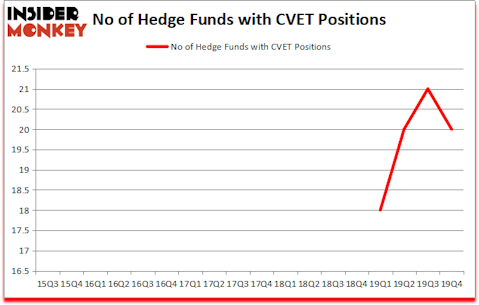Hedge funds don’t get the respect they used to get. Nowadays investors prefer passive funds over actively managed funds. One thing they don’t realize is that 100% of the passive funds didn’t see the coronavirus recession coming, but a lot of hedge funds did. Even we published an article near the end of February and predicted a US recession. Think about all the losses you could have avoided if you sold your shares in February and bought them back at the end of March.
In these volatile markets we scrutinize hedge fund filings to get a reading on which direction each stock might be going. Out of thousands of stocks that are currently traded on the market, it is difficult to identify those that will really generate strong returns. Hedge funds and institutional investors spend millions of dollars on analysts with MBAs and PhDs, who are industry experts and well connected to other industry and media insiders on top of that. Individual investors can piggyback the hedge funds employing these talents and can benefit from their vast resources and knowledge in that way. We analyze quarterly 13F filings of nearly 835 hedge funds and, by looking at the smart money sentiment that surrounds a stock, we can determine whether it has the potential to beat the market over the long-term. Therefore, let’s take a closer look at what smart money thinks about Covetrus, Inc. (NASDAQ:CVET).
Is Covetrus, Inc. (NASDAQ:CVET) undervalued? Hedge funds are in a pessimistic mood. The number of bullish hedge fund bets were cut by 1 lately. Our calculations also showed that CVET isn’t among the 30 most popular stocks among hedge funds (click for Q4 rankings and see the video at the end of this article for Q3 rankings).

We leave no stone unturned when looking for the next great investment idea. For example, this investor can predict short term winners following earnings announcements with 77% accuracy, so we check out his stock picks. A former hedge fund manager is pitching the “next Amazon” in this video; again we are listening. We read hedge fund investor letters and listen to stock pitches at hedge fund conferences. Our best call in 2020 was shorting the market when S&P 500 was trading at 3150 after realizing the coronavirus pandemic’s significance before most investors. With all of this in mind we’re going to take a gander at the fresh hedge fund action encompassing Covetrus, Inc. (NASDAQ:CVET).
How are hedge funds trading Covetrus, Inc. (NASDAQ:CVET)?
At Q4’s end, a total of 20 of the hedge funds tracked by Insider Monkey were bullish on this stock, a change of -5% from one quarter earlier. The graph below displays the number of hedge funds with bullish position in CVET over the last 18 quarters. So, let’s review which hedge funds were among the top holders of the stock and which hedge funds were making big moves.

The largest stake in Covetrus, Inc. (NASDAQ:CVET) was held by Freshford Capital Management, which reported holding $64.4 million worth of stock at the end of September. It was followed by Viking Global with a $44.6 million position. Other investors bullish on the company included Arlington Value Capital, Two Sigma Advisors, and Luminus Management. In terms of the portfolio weights assigned to each position Freshford Capital Management allocated the biggest weight to Covetrus, Inc. (NASDAQ:CVET), around 11.37% of its 13F portfolio. Scion Asset Management is also relatively very bullish on the stock, earmarking 8.92 percent of its 13F equity portfolio to CVET.
Judging by the fact that Covetrus, Inc. (NASDAQ:CVET) has experienced declining sentiment from the aggregate hedge fund industry, it’s easy to see that there was a specific group of money managers that elected to cut their full holdings last quarter. Intriguingly, Lei Zhang’s Hillhouse Capital Management cut the biggest stake of the “upper crust” of funds monitored by Insider Monkey, valued at about $47.1 million in stock. Brandon Haley’s fund, Holocene Advisors, also dropped its stock, about $1.7 million worth. These moves are intriguing to say the least, as aggregate hedge fund interest was cut by 1 funds last quarter.
Let’s also examine hedge fund activity in other stocks – not necessarily in the same industry as Covetrus, Inc. (NASDAQ:CVET) but similarly valued. These stocks are Helios Technologies, Inc. (NASDAQ:HLIO), CBIZ, Inc. (NYSE:CBZ), 360 Finance, Inc. (NASDAQ:QFIN), and AeroVironment, Inc. (NASDAQ:AVAV). This group of stocks’ market valuations match CVET’s market valuation.
| Ticker | No of HFs with positions | Total Value of HF Positions (x1000) | Change in HF Position |
|---|---|---|---|
| HLIO | 6 | 72443 | 2 |
| CBZ | 13 | 183300 | 2 |
| QFIN | 12 | 17569 | 8 |
| AVAV | 13 | 45195 | 2 |
| Average | 11 | 79627 | 3.5 |
View table here if you experience formatting issues.
As you can see these stocks had an average of 11 hedge funds with bullish positions and the average amount invested in these stocks was $80 million. That figure was $178 million in CVET’s case. CBIZ, Inc. (NYSE:CBZ) is the most popular stock in this table. On the other hand Helios Technologies, Inc. (NASDAQ:HLIO) is the least popular one with only 6 bullish hedge fund positions. Compared to these stocks Covetrus, Inc. (NASDAQ:CVET) is more popular among hedge funds. Our calculations showed that top 10 most popular stocks among hedge funds returned 41.4% in 2019 and outperformed the S&P 500 ETF (SPY) by 10.1 percentage points. These stocks gained 1.0% in 2020 through May 1st and still beat the market by 12.9 percentage points. Unfortunately CVET wasn’t nearly as popular as these 10 stocks and hedge funds that were betting on CVET were disappointed as the stock returned -17.3% during the four months of 2020 (through May 1st) and underperformed the market. If you are interested in investing in large cap stocks with huge upside potential, you should check out the top 10 most popular stocks among hedge funds as most of these stocks already outperformed the market in 2020.

Video: Click the image to watch our video about the top 5 most popular hedge fund stocks.
Disclosure: None. This article was originally published at Insider Monkey.


